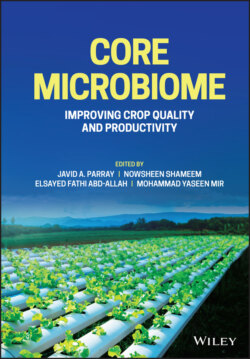Читать книгу Core Microbiome - Группа авторов - Страница 60
4.2 Applications of Compost 4.2.1 Compost Use for Soil Amendment and as Conditioner
ОглавлениеThe role of organic amendments in agriculture is to provide minerals to the crops and improve soil properties. Many physicochemical changes in the soil are due to modifications that help minimize chemical fertilizers (Bonilla et al. 2012). Organic amendments include manure, crop and food residues, compost, and fertilizers. The compost helps maintain soil stability. This also promotes the balance within the agroecosystem. The composting process converts organic waste into a humus-like substance called compost, which can be used as a soil fertility booster (Li et al. 2013).
Compost helps improve soil properties by minimizing bulk density and enhancing the permeability and stability of the soil. As a result, it also increases the water absorption capacity of the soil (Adugna 2016) and reduces soil abrasion (Martinez-Blanco et al. 2013). Compost improves drought resistance and soil physical properties (Adugna 2016), increases the availability of nutrients and microbial populations, and enhances crop yield (Chelah et al. 2011). Compost use in soil amendment increases surface water infiltration and reduces the intensity of surface run-off from land, and also reduces transport of dissolved and suspended phosphorus and nitrate–nitrogen. The addition of compost in agricultural soil is also known to significantly increase the organic material in the soil (Bellamy et al. 2005).
Compost amendment to soil also helps delay surface degradation. Tong et al. (2018) have reported the reuse of wastes as compost for enhancing soil properties in the afforested land of Beijing plain.
